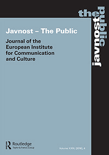
JAVNOST-THE PUBLIC
Scope & Guideline
Cultivating Understanding in Public Engagement
Introduction
Aims and Scopes
- Public Sphere Theory:
The journal consistently investigates the theoretical frameworks surrounding public spheres, focusing on how these spaces function in contemporary society and their evolution in response to political and technological changes. - Digital Communication and Media:
A significant area of focus is the impact of digital communication technologies on public discourse, including how social media platforms transform engagement, participation, and the dissemination of information. - Social Movements and Counterpublics:
The journal addresses the dynamics of social movements and counterpublics, analyzing how marginalized voices and movements challenge dominant narratives and contribute to societal change. - Media Ethics and Accountability:
There is a strong emphasis on ethical considerations in media practices, exploring the responsibility of media organizations in fostering democratic discourse and the implications of misinformation. - Cultural and Political Contexts:
The journal examines the interplay between cultural and political contexts, particularly how local and global events shape public perceptions and media representations.
Trending and Emerging
- Impact of Digital Platforms on Public Discourse:
There is a growing emphasis on how digital platforms influence public discourse, particularly regarding issues of misinformation, data privacy, and the role of algorithms in shaping user engagement. - Crisis Communication and Public Engagement:
Research on crisis communication, particularly in the context of the COVID-19 pandemic, has surged, focusing on how public engagement strategies evolve during times of crisis and their implications for democracy. - Emergence of New Publics and Activism:
The journal is increasingly exploring the emergence of new publics, particularly in relation to social movements like Black Lives Matter, highlighting how these movements reshape the public sphere and challenge existing power structures. - Ethics of Artificial Intelligence in Public Discourse:
The ethical implications of artificial intelligence and its role in public communication are gaining traction, with discussions centered on accountability, transparency, and the societal impacts of AI technologies. - Intersectionality in Public Discourse:
There is an emerging focus on intersectionality, particularly how various identities and experiences shape public discourse and influence media representations, reflecting a broader commitment to inclusivity in research.
Declining or Waning
- Traditional Media Analysis:
There has been a noticeable decline in the focus on traditional media outlets and their role in public discourse, as the journal shifts towards examining digital platforms and new media landscapes. - Historical Perspectives on Media:
Research that emphasizes historical analysis of media systems and public spheres appears to be waning, potentially overshadowed by the immediacy of contemporary issues and the fast-paced evolution of digital communication. - Local News Dynamics:
The exploration of local news dynamics and their impact on community engagement has decreased, possibly due to the broader focus on global digital communication trends and their implications.
Similar Journals
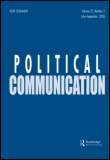
POLITICAL COMMUNICATION
Unpacking the Impact of Media on Political LandscapesPOLITICAL COMMUNICATION, published by Taylor & Francis Inc, stands as a premier journal in the fields of communication and sociology, recognized for its significant contributions to the study of political discourse and media effects since its inception in 1980. With its impact factor reflecting its prominence—ranked in the Q1 category among peers, including a remarkable position of Rank #13 in Sociology and Political Science and Rank #6 in Communication—this journal showcases groundbreaking research that shapes contemporary understanding of political communication dynamics. Researchers and professionals in these fields are urged to engage with the journal's comprehensive articles that explore the intersection of media, politics, and public understanding, thereby contributing to a richer dialogue in these essential socio-political arenas. Although not open access, the journal remains a crucial resource for advancing scholarship and is committed to fostering innovative research and critical analyses vital for the academic community.
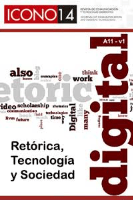
Revista Icono 14-Revista Cientifica de Comunicacion y Tecnologias
Pioneering Insights in Communication TechnologiesRevista Icono 14 is a distinguished scientific journal dedicated to the fields of communication and technology, published by ICONO 14 since 2003. With its open access policy, the journal actively promotes the dissemination of research findings, making valuable knowledge accessible to researchers, professionals, and students worldwide. Based in Spain, the journal has established itself as a reputable source in its field, achieving a Q2 quartile ranking in communication and placing within the top 75th percentile among social sciences communication journals in the Scopus database. The journal serves as a platform for innovative research covering a wide scope of topics related to communication technologies, enabling scholars to explore advancements and challenges within the discipline. As it embarks on its converged years from 2018 to 2024, Revista Icono 14 stands as a vital resource for cutting-edge research that shapes the future of communication studies.

Nordicom Review
Empowering Scholarly Dialogue in Communication ResearchNordicom Review is a preeminent open-access journal published by SCIENDO, dedicated to advancing the field of communication studies. Established in Sweden, it has been at the forefront of disseminating scholarly research since its inception in 2000, providing a platform for innovative ideas and discussions. With an impressive impact factor that reflects its commitment to quality, the journal has achieved a remarkable Q1 rating in the Communication category for 2023, ranking 154 out of 511 in Scopus, placing it in the 69th percentile among peer-reviewed journals. The Nordicom Review embraces a broad scope, covering topics that intersect with media, communication policies, and societal implications, making it indispensable for researchers, professionals, and students alike. This journal supports the dissemination of knowledge and fosters dialogue among scholars, ensuring that crucial developments in communication are accessible globally.
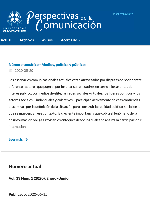
Perspectivas de la Comunicacion
Illuminating Contemporary Issues in CommunicationPerspectivas de la Comunicacion is an esteemed open-access academic journal published by UNIV FRONTERA, dedicated to the field of communication studies. With an ISSN of 0718-4867, the journal has established itself as a vital resource for scholars and practitioners since its inception in 2008, offering a platform for innovative research and discourse across various communication paradigms. Located in the heart of Chile at AV FRANCISCO SALAZAR, TEMUCO, this journal caters to a diverse international audience, encouraging contributions that reflect the global nature of communicative practices. While specific ranking metrics such as HIndex and Scopus Ranks are not readily available, the journal's open-access model ensures that its contributions are widely disseminated, promoting greater accessibility and engagement within the academic community. The objectives of Perspectivas de la Comunicacion include fostering critical discussion on contemporary issues in communication, highlighting interdisciplinary research, and providing a space for emerging voices in the field. This commitment to scholarly excellence positions the journal as a significant player in advancing knowledge and understanding within communication studies.

Central European Journal of Communication
Connecting Scholars, Practitioners, and Ideas in CommunicationCentral European Journal of Communication, published by the Polish Communication Association, is a pivotal resource in the field of communication studies. Since its inception, this journal has become a significant platform for scholarly discourse, contributing valuable research and insights that span the diverse landscape of communication. With its current classification in the Q3 quartile of the communication category and a ranking of #315 out of 511 in Scopus, it is positioned to foster growth in communication research and practice within Central Europe and beyond. The journal invites submissions that explore a wide array of topics pertinent to communication, ensuring a robust dialogue among researchers, professionals, and students alike. Although currently operating under traditional access formats, the journal aims to enhance visibility and engagement by prioritizing quality content that addresses contemporary issues in communication, making it an essential resource for those looking to deepen their understanding of this dynamic field.
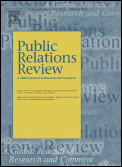
PUBLIC RELATIONS REVIEW
Elevating Standards in Public Relations Scholarship.PUBLIC RELATIONS REVIEW, published by Elsevier Science Inc, stands as a premier academic journal dedicated to advancing the field of public relations, marketing, and organizational communication. With an impressive impact factor and a distinguished track record since its inception in 1975, this journal has consistently ranked in the Q1 quartile for its categories, showcasing its critical role in scholarly discourse. The journal, which operates without Open Access options, offers insightful articles that blend theoretical frameworks with practical applications, making it an essential resource for researchers, professionals, and students alike. Its authoritative coverage in areas like communication, organizational behavior, and marketing is evidenced by its high Scopus rankings, placing it among the top percentile of journals in these fields. As the landscape of public relations continues to evolve, PUBLIC RELATIONS REVIEW remains at the forefront of scholarship, providing a vital platform for innovative research and discussions that shape industry practices and academic understanding.
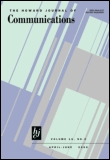
Howard Journal of Communications
Pioneering insights in the evolving landscape of communication studies.The Howard Journal of Communications, published by Routledge Journals, Taylor & Francis Ltd, is a leading academic journal dedicated to advancing the field of communications. With a strong focus on both theoretical and practical elements, it has established itself as a vital resource for researchers, professionals, and students since its inception in 1988. The journal holds a prestigious Q2 ranking in the categories of Communication and Strategy and Management for 2023, positioning it among the top publications in these fields. The Scopus ranking also highlights its importance, with a notable rank of #158 in Social Sciences Communication and #268 in Business, Management and Accounting. Although the journal does not offer open access at this time, its comprehensive scope and commitment to quality scholarship ensure it remains an essential platform for disseminating innovative research and ideas in the rapidly evolving landscape of communication studies. Located in the United Kingdom, the journal continues to foster interdisciplinary dialogue and enhance academic discourse within these vital disciplines.

Doxa Comunicacion
Cultivating a vibrant community of communication scholars.Doxa Comunicación is a prominent open-access journal dedicated to advancing the field of communication studies, published by Universidad San Pablo CEU, under the Faculty of Humanities and Communication Sciences. Established in 2003, this journal has gained recognition for its commitment to disseminating high-quality research and thought-provoking articles, fostering a vibrant academic community. With an ISSN of 1696-019X and an E-ISSN of 2386-3978, Doxa Comunicación occupies a vital niche in the academic landscape of Spain, contributing to both national and international discourses. In the 2023 rankings, it is categorized in the Q3 quartile within the fields of Communication and Social Sciences (miscellaneous), reflecting its competitive standing among peer publications. The journal's diverse scope, including contemporary communication theories and practices, ensures relevance for researchers, professionals, and students alike. With a Scopus rank of #333 in Social Sciences (miscellaneous) and #291 in Communication, Doxa Comunicación serves as an essential platform for innovative research that addresses the complex challenges of modern communication in a rapidly evolving society.
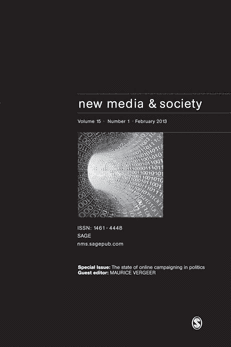
NEW MEDIA & SOCIETY
Unveiling Insights into Digital Dynamics and Social ChangeNEW MEDIA & SOCIETY is a leading academic journal published by SAGE PUBLICATIONS LTD, specializing in the dynamic interplay between new media and its impact on society. Established in 1999, the journal has become a vital resource for researchers and professionals within the fields of communication, sociology, and political science, consistently ranking in the first quartile (Q1) of its categories according to the 2023 Scopus Rankings. With an impressive percentile of 98th in both communication and sociology disciplines, NEW MEDIA & SOCIETY provides a platform for cutting-edge research that explores the complexities of digital interaction and its societal implications. Although the journal is not open access, it remains accessible through various academic institutions, making it an essential reference for students and scholars aiming to engage with the latest advancements in new media research. As the journal converges its focus into 2024, it aims to foster interdisciplinary dialogue and innovation, addressing critical issues related to digital technologies and their role in shaping contemporary society.

Information Communication & Society
Pioneering Insights into the Future of CommunicationInformation Communication & Society, published by Routledge Journals, Taylor & Francis Ltd, is a premier journal in the fields of communication and library and information sciences, boasting an impressive impact factor and consistently high rankings in Scopus, including Rank #18/511 in Communication and Rank #14/280 in Library and Information Sciences for 2023. With its focus on the dynamic interplay between information technology and society, the journal serves as a vital platform for researchers, professionals, and students, facilitating the discussion of contemporary issues that shape digital environments. Since its inception in 2001 and converging from 2005 to 2024, the journal has maintained a rigorous peer-review process to ensure that it publishes high-quality research that contributes to ongoing debates and developments in the digital age. Although it does not offer open access, the journal's esteemed reputation and Q1 categorization underscore its impact within the academic community, making it an essential resource for anyone interested in the evolution of communication in the modern world.